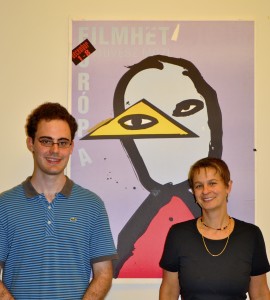 While researching domestic violence in Lithuania, Professor Katalin Fabian learned of a woman who is offering karate classes at one crisis center as a way to empower victims, some who are in their 70s.
While researching domestic violence in Lithuania, Professor Katalin Fabian learned of a woman who is offering karate classes at one crisis center as a way to empower victims, some who are in their 70s.
“They are facing acts of violence all around them,” says Fabian, noting the country doesn’t have a law that criminalizes domestic violence, which means victims have little or no legal recourse from their abusers. “They want to have a better awareness of their bodies and an ability to protect themselves.”
Since the fall of Communism in the 1990s, domestic violence remains still a relatively new term in Lithuania, and the country is grappling with ways to address it. Fabian, associate professor of government and law, who traveled to Lithuania this summer and last year to Latvia, is studying the issue with Excel Scholar Glenn Chabora ’12 (Aberdeen, N.J.).
“If you get beaten in your own home, it’s considered a private issue,” explains Chabora, an international affairs major. “A woman can take the complaint to court, but it’s unlikely she’ll win.”
Laws are also lax if the abuse between intimate partners occurs in public.
“If he beats her on the street, it gets prosecuted under hooliganism,” Chabora adds.
Because domestic violence isn’t considered a crime, it goes unreported, so statistics regarding its prevalence are difficult to come by or don’t exist, says Fabian, editor of Domestic Violence in Postcommunist States: Local Activism, National Policies, and Global Forces. However, the sheer number of women seeking asylum in shelters and crisis centers indicate the problem is a growing one exacerbated by the country’s struggling economy and over 18 percent unemployment rate.
While visiting Lithuania, Fabian interviewed dozens of people active in providing programs and support to those affected by domestic violence, as well as victims themselves, and then emailed Chabora the audio files.
“I would transcribe the interviews and add analysis and commentary,” Chabora says. Most of the interviews were in English. An interpreter traveling with Fabian translated ones conducted in Lithuanian to English.
Fabian’s research and interviews revealed that the country is not alone in its efforts to combat domestic violence. “The fight against domestic violence is a lot more globalized than we thought,” Glenn adds. “These NGO activists are not just a few people who are isolated working with other Lithuanians. There’s a community of people working internationally across Europe.”
In the past few years, more shelters have opened offering not only a place to stay, but psychological counseling, employment help and child care services. Hotlines have been installed and victims can obtain free legal help for divorce and other issues. The country has a long way to go, but it’s moving in the right direction, Fabian says.
Just as important, people’s attitudes toward domestic violence are changing, and it’s no longer considered a joke or taboo topic.
“It had been improper to speak about domestic violence,” says Chabora. “People would snicker in front of the new posters about domestic violence. Now they’re talking about this issue much more seriously. It’s more frequently in the news. This topic is gaining ground as a serious issue. What you’re starting to see is a cultural and societal acceptance that something needs to be done.”
Chabora plans to pursue a career in diplomatic service and says the research he’s conducting with Fabian has taught him plenty about working with different cultures. “You can’t go into a country and say, ‘I know everything, listen to me,’” he says. “You have to understand where people are coming from to understand where they’re going.”
Take, for example, the issue of property rights. “In the U.S., you wouldn’t think twice about kicking an abusive spouse out of your house, but in Lithuania, property, such as a house or apartment, is sacrosanct,” he says. “Being a diplomat is about being a team player. It’s about give and take. Not everyone thinks like we do and if you want to accomplish anything, you have to respect that.”

1 Comment
Comments are closed.